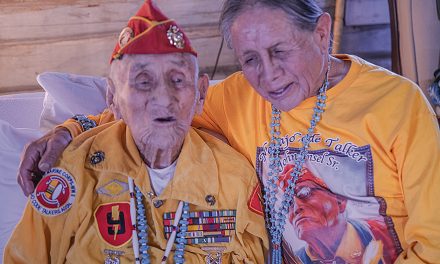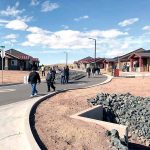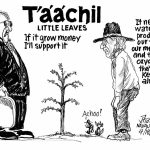
Nez joins Biden for $1.2T bill signing
WINDOW ROCK
President Jonathan Nez on Monday joined President Joe Biden and members of Congress for the bipartisan ceremony commemorating the signing of the $1.2 trillion Infrastructure Investment and Jobs Act held on the White House lawn.
The bill delivers an unprecedented $550 billion in federal investment to revitalize America’s aging transportation and utility infrastructure over five years.
“It was truly an honor to be invited to the White House to represent the Navajo people for this monumental signing of the infrastructure bill, which will invest more than $11 billion in Indian Country for transportation, broadband, energy, water and sanitation facilities, and climate resiliency,” Nez said.
“This measure will also fully fund the Navajo Utah Water Rights Settlement Act to provide much-needed water resources for Navajo people,” he said.
In his remarks, Biden said the bill will create jobs, change millions of lives for the better and is the largest investment in the Nation’s chronically underfunded tribal communities.
“Throughout our history we’ve emerged from crisis by investing in ourselves,” Biden said. “We’re emerging from COVID-19 pandemic and will build an economy for the 21st century. There is no limit to what our people can do and our nation can do…. Let’s believe in possibilities and let’s believe in one another.”
Speaker Seth Damon said that by signing the bill into law, Biden sent a clear message that sovereign Native nations are a top priority for his administration.
Nez said the bill is another historic measure that invests in Native communities with:
- $2.5 billion for the Reclamation Water Settlement Fund to fully fund existing Indian Water Rights Settlements.
- $3 billion for the U.S Department of Transportation Tribal Transportation Program over five years with an additional $925 million for the Tribal Transportation Facility Bridges program.
- $2 billion for the National Telecommunications and Information Administration Tribal Broadband Connectivity Program.
- $3.5 billion over five years for improvements and construction for the Indian Health Service’s Sanitation Facilities Construction Program.
- $11.2 billion for grants to states and tribes for abandoned coal mine land and water reclamation projects.
- $55.4 billion for state and tribal assistance grants for providing clean and safe drinking water to communities.
- $6 billion for the Battery Material Processing Grant and Battery Manufacturing and Recycling Grant programs that will prioritize grants to eligible entities that partner with tribes.
“Infrastructure is the primary building block of our communities,” Vice President Myron Lizer said. “This investment will not only help rebuild roads and bridges our people need to access basic services, but it will lay the foundation for many communities who will see broadband or water delivery for the very first time.”
According to the speaker’s office, the U.S. Department of the Interior stated the bill also makes historic investments in tribes’ efforts to tackle the climate crisis.
“Indigenous communities are facing unique climate-related challenges that pose existential threats to tribal economies, infrastructure, livelihoods, and health,” Interior Deb Haaland said.
“The Bipartisan Infrastructure Deal’s historic investments in tribal communities will help bolster community resilience, replace aging infrastructure,” she said, “and provide support needed for climate-related relocation and adaptation.”
Nez said the infrastructure funds will build upon the success of the CARES Act expenditures, which provided 700 Navajo families with electricity and funded 300 off-grid solar installations, 117 water and wastewater upgrades and replacements, 105 water cistern systems, 30 new waterline connections to homes, 139 broadband installations and upgrades, four new broadband/cell phone towers, and hardship assistance for Navajo people.
Currently, bills are under development to provide another round of hardship assistance and infrastructure development/improvements using the $2.1 billion Navajo received from the American Rescue Plan Act funds, stated Nez’s office.








 Highway 264,
Highway 264, I-40, WB @ Winslow
I-40, WB @ Winslow